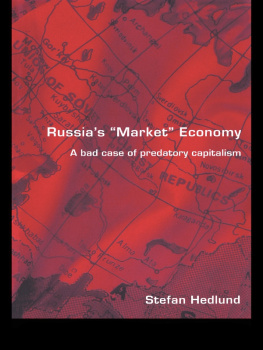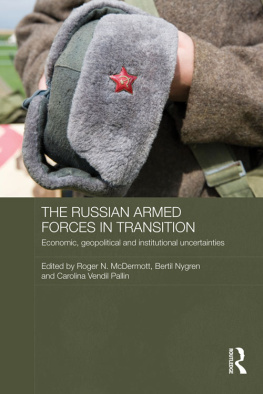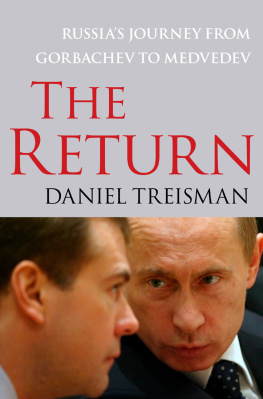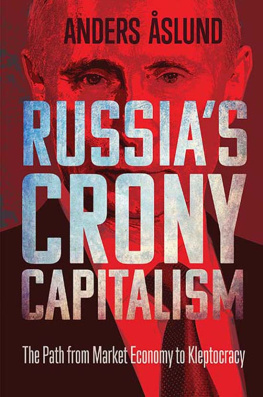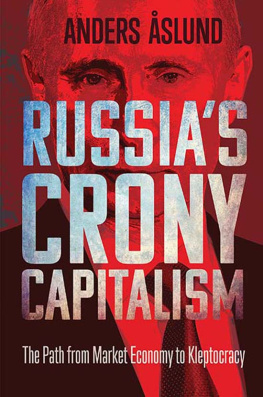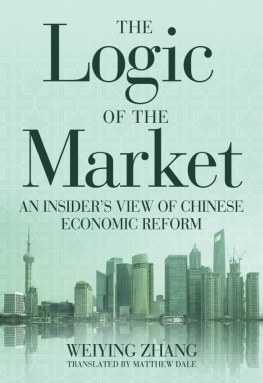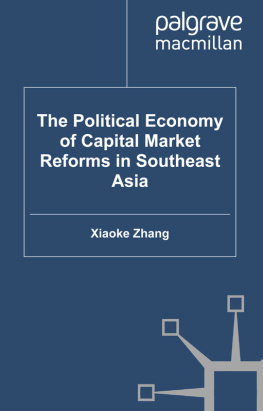Stefan Hedlund, 1999
This book is copyright under the Berne Convention.
No reproduction without permission.
All rights reserved.
First published 1999 in the UK and the USA by
UCL Press Limited
11 New Fetter Lane
London EC4P 4EE
The name of University College London (UCL) is a registered trade mark used by UCL Press with the consent of the owner.
This edition published in the Taylor & Francis e-Library, 2003.
UCL Press is an imprint of the Taylor & Francis Group
ISBN 0-203-49543-8 Master e-book ISBN
ISBN 0-203-55783-2 (Adobe eReader Format)
ISBNs: 1-84142-054-9 HB
1-84142-053-0 PB
British Cataloguing-in-Publication Data
A catalogue record for this book is available from the British Library.
Library of Congress Cataloging-in-Publication
Data are available
For Lilian, with love
Preface
Those who steal from private individuals are placed in iron and chains, but those who steal from public coffers are dressed in gold and crimson. Cato (the elder)
Sitting down to pencil a few introductory words to the reader, I cannot help but recall a passage from Lewis Carrolls Through the Looking Glass: The time has come, the walrus said, to speak of many things. In the following we shall indeed be speaking of many things. We shall see great expectations and great failures. We shall delve deep into the grand themes of Russian history, and we shall apply the magnifying glass to some of the most recent events. We shall look at Western attempts to help out, and at Russian ambivalence towards such involvement. And we shall try to look into the future.
The book is structured into four sections, with four different objectives. The first is mainly introductory, seeking to present a tour dhorizon for the remaining chapters. Section two presents a framework for the subsequent analysis. It defines the focus of attention, by charting four different zones of confrontation where the executive power must engage other actors (in the legislature, the judiciary, the financial markets and the entrepreneurial sector). It looks at the prelude to events taking place under Gorbachev, and it presents the story of a growing involvement by the West in Russias attempted reforms.
In section three the economic reform programme is presented. It looks at the first years of high inflation, which led to a massive redistribution of both wealth and incomes, moves on to the subsequent period of low inflation, when the government resorted instead to massive borrowing, and rounds off by looking at the political scandals that surrounded various privatization deals, at the financial pyramid games that collapsed in August 1998, and at the political leadership style of President Boris Yeltsin.
Section four contains the theoretical analysis. Using tools from institutional theory, it presents the outline of a powerful Russian path dependence. It is argued that Russias current troubles have roots that may be traced back to old Muscovy, and it is shown that the parallel ambitions of economists to introduce market economy and of jurists to introduce the rule of law were seriously flawed.
The leitmotif of the book as a whole is also the main tenet of institutional theory, namely, that while formal rules may be changed overnight informal norms take longer to adjust. By totally ignoring such insights, the Russian reformers never really had any chance of success.
Although history will figure prominently throughout the text, there is no pretence of original historical research. We shall rely exclusively on the work of others, and in particular on what Richard Pipes has written about the patrimonial society. And we shall select only those parts of history that are of relevance to the arguments pursued. Thus Russian history will appear at various points in the text.
In we return to history with a more analytical ambition, mainly using the tools of institutional theory.
As always in writing about Russia in foreign languages, transliteration poses a problem. Here we take the easy way out. Names of the great tsars will be given in their familiar English forms. All others will be transliterated. Thus it will be Alexander II but Aleksandr Rutskoi. Diacritical signs will be omitted throughout.
Bits and pieces of the text have appeared before, in articles, discussion papers and seminar presentations. Of the very many people who at various points have provided feedback that eventually went into this book, I would like to mention in particular Thrinn Eggertsson, Tim McDaniel, Douglass North, Mancur Olson and Leonid Polishchuk.
The final manuscript has been read, wholly or in parts, by Carl Linden, James Millar, Richard Pipes, John Richards, Steven Rosefielde, Peter Rutland, Lszl Szamuely and Tsuneaki Tanaka. I owe them all, including two anonymous referees, a large debt for helpful comments and criticisms and will hold none accountable for remaining errors and omissions.
Stefan Hedlund
Sollentuna, 21 November 1998
CHAPTER ONE
Russian riches mismanaged
Russia is a land of great riches. Across its eleven time zones stretches a variety and a wealth of natural resources that represent true abundance. If only these riches could have been tapped and managed in a reasonably efficient way, the peoples living on this land would have been living a good life indeed. Regrettably, however, Russias long history is one of great mismanagement. The resources once given by God have not been put to their best use, to put it mildly, and the peoples of present-day Rus are not living the good life they could have been enjoying.
There are two important problems embedded in these observations. The first is theoretical and concerns the role of initial conditions in making forecasts for possible growth trajectories. In a case where there is both a wealth of natural resources and an educated workforce, two necessary conditions for positive growth have been fulfilled. But, and this is important, pointing at favourable initial conditions is far from sufficient. We must also be able to identify a production function that will make it possible to transform the initial endowments into a growing wealth of services and finished goods. And here the record of the Russian past is rather discouraging.
Over the centuries there have been many windows of opportunity, where both foreign traders and domestic reformers have developed great plans to unlock and develop Russias hidden wealth. For a variety of reasons, however, neither category has met with any great degree of success. The windows for trade have been narrow and the domestic spurts of reform activity have been brief.
To those who argue that present-day Russia is so richly endowed with resources that an economic boom simply has to follow, these observations do present a problem. If the argument is to be taken seriously, something will also have to be said about the software of the system, i.e. about the production function. This implies that the pre-conditions for reform mustbe placed in focus. It must be shown that Russia is finally ready to be integrated into the world economy and to go about its domestic business in a rational and efficient manner. In subsequent chapters we shall have a lot to say about this.

